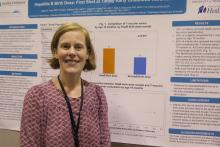TORONTO – Infants who do not receive the hepatitis B vaccine birth dose are less likely to be up-to-date recipients of recommended vaccines by 19 months, based on results from a retrospective study of more than 9,000 infants.
“As pediatricians, we should be mindful of that when we are meeting families after the birth hospitalization and start a conversation at that point around vaccines,” one of the study authors, Annika M. Hofstetter, MD, PhD, said in an interview at the Pediatric Academic Societies meeting.
Dr. Hofstetter, a pediatrician at the University of Washington and Seattle Children’s Hospital, noted that, despite U.S. recommendations that newborns weighing at least 2,000 g should receive a birth dose of hepatitis B vaccine (HBV), nearly one-quarter of Washington State infants do not receive this first dose on time. In an effort to determine whether receipt of the HBV during the birth hospitalization is associated with completing the recommended seven-vaccine series by age 19 months, senior author Natalia Oster, MPH, Dr. Hofstetter, and their colleagues retrospectively reviewed hospital medical records and Washington State Immunization Information System data on 9,080 infants born weighing at least 2,000 g and receiving hospitalization care during Jan.1, 2008-Dec. 31, 2013. They used logistic regression to assess the association between HBV birth dose receipt and seven-vaccine series completion by age 19 months, after adjustment for demographic, clinical, and visit characteristics.Of the 9,080 infants, 51% were male, 49% were non-Hispanic white, 56% were covered by public health insurance, and 47% stayed in the hospital for 48 hours or longer. The researchers reported that 76% infants received the HBV during the birth hospitalization, and 54% of subjects completed the seven-vaccine series by age 19 months. They also found that (P less than .001). Infants who received the HBV birth dose were 2.9 times more likely to complete the seven-vaccine series by age 19 months, compared with those who did not receive the HBV birth dose.
“Parents are making their first vaccine decision during that birth hospitalization,” said Dr. Hofstetter, who also conducts immunization research studies at Seattle Children’s Research Institute. “It’s unclear what underlies this decision, such as specific parent concerns or the way in which we as providers in the hospital are communicating vaccine information to the families. It’s telling, and it will be interesting to further explore the factors that are determining whether a family gets the vaccine during the birth hospitalization or not, and how we as a pediatric community can start having effective vaccine conversations earlier.”
She acknowledged certain limitations of the study, including the potential for misclassification errors in vaccine reporting systems and the fact that no data were available on parental attitudes about vaccination. The researchers reported having no financial disclosures.


